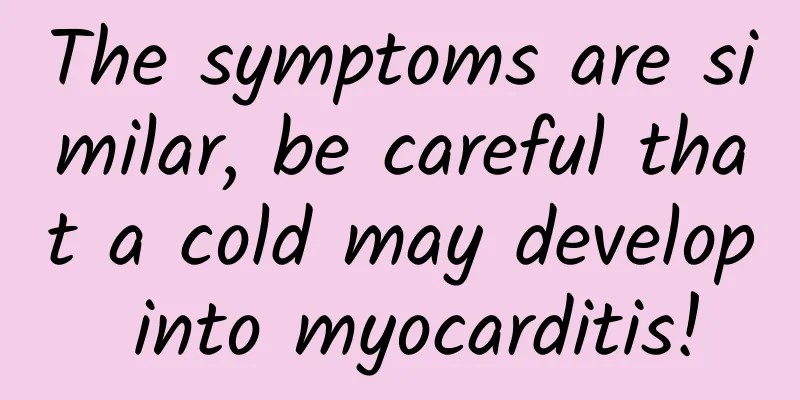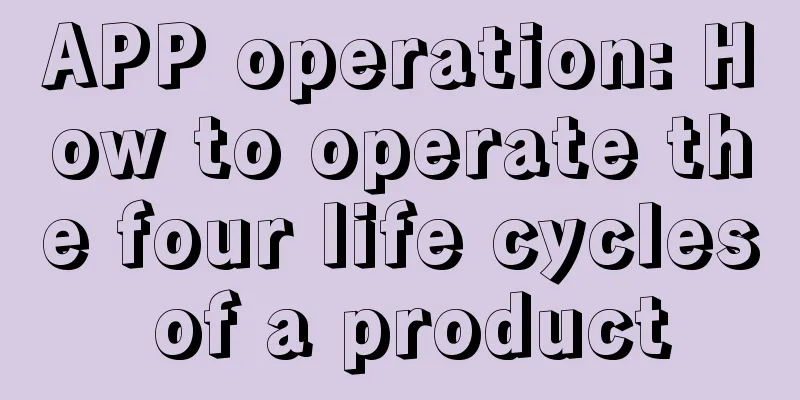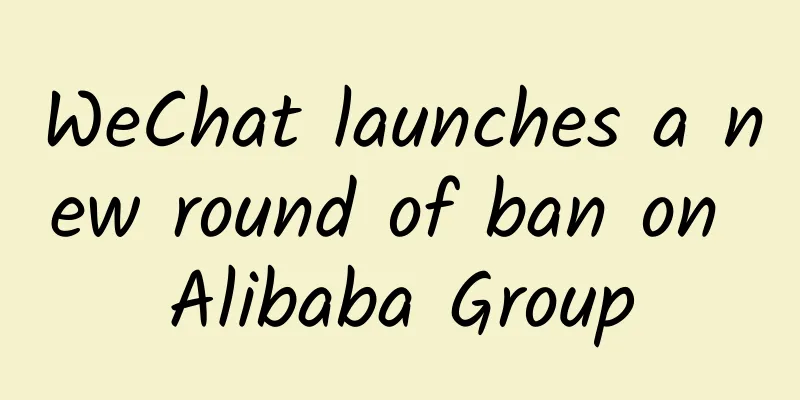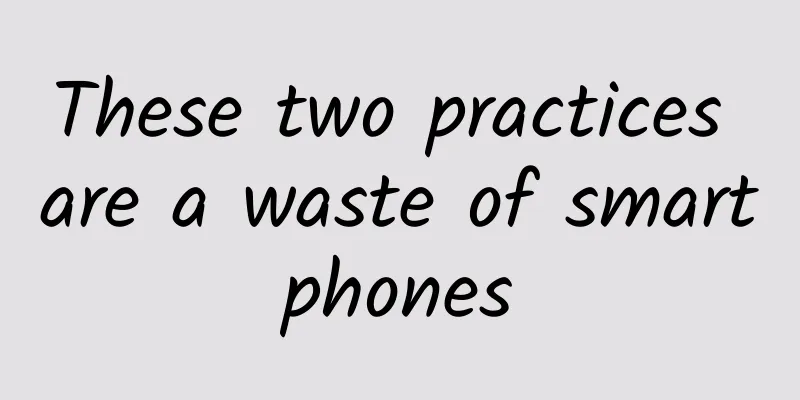[Fat Bear Science] Is chemotherapy ineffective? Is it the devil? Experts say: If you believe this, you will be infected...
![[Fat Bear Science] Is chemotherapy ineffective? Is it the devil? Experts say: If you believe this, you will be infected...](/upload/images/67f265950c425.webp)
|
When it comes to chemotherapy, many people first think of the side effects of chemotherapy (vomiting, hair, lack of energy, etc.)... Some people even believe that chemotherapy is not only ineffective but may accelerate the patient's death. So, what is chemotherapy? Why do side effects occur? What are some of the misconceptions people have about it? Next, I will introduce you to chemotherapy! Expert introduction Wang Lulu On the 135 course learning platform, you can not only learn excellent courses yourself, but you can also directly share high-quality courses with others. Wang Shuaiqi Attending physician of the Gastrointestinal Tumor Center of the Affiliated Tumor Hospital of Chongqing University, master's student, member of Chongqing Anti-Cancer Association, member of Chongqing Medical Association, specializes in the comprehensive treatment of gastric cancer and colorectal cancer. 1 Chemotherapy, surgery and radiotherapy are called the three horses in the fight against cancer! Chemotherapy drugs, also known as cytotoxic drugs, have a strong toxic effect on rapidly growing cells in the body, so they kill wildly growing cancer cells. However, chemotherapy drugs do not have the ability to distinguish between "friend and foe", so some normal cells in the body that grow faster, such as bone marrow cells, hair follicle cells in the hair, and gastrointestinal cells, will also be "accidentally injured". Therefore, chemotherapy patients often experience adverse reactions such as nausea, vomiting, bone marrow suppression, and hair loss. Will every chemotherapy patient experience serious adverse reactions? NO! Not really. Everyone has different physiques, and the side effects of chemotherapy can vary greatly. In the hospital, you can see that many chemotherapy patients do not lose their hair, and they can be energetic and walk around during chemotherapy. Even if adverse reactions occur, they can be reversed. As long as the drug is stopped for a period of time and symptomatic treatment is given, the adverse reactions caused by chemotherapy will recover quickly. Clinically, "cyclical chemotherapy" and active prevention and treatment of adverse reactions are often used to control tumor growth while reducing the occurrence of adverse reactions. In addition, with the development of medicine, the side effects of chemotherapy drugs are getting smaller and smaller. Therefore, there is no need to be afraid of chemotherapy, doctors will try their best to minimize the side effects of chemotherapy! 2 Many people in the cancer community have forwarded articles about chemotherapy being "ineffective and harmful," accusing chemotherapy of not only being ineffective but also hastening the patient's death. Although chemotherapy has obvious side effects, it has made an indelible contribution to the fight against cancer! When you have cancer, the first question you think about is, can it be removed surgically? Will it be cured? That's right, "comprehensive treatment with surgery as the main treatment" is the current treatment principle. However, malignant tumors are systemic diseases. Many patients are already in the late stage of cancer when diagnosed (the tumor has already metastasized to other parts of the body), and surgery cannot remove all tumors in the body. Chemotherapy is a systemic treatment that enters the body orally or intravenously and can reach all parts of the body through blood circulation. It is an important auxiliary treatment method! Different types of tumors have different sensitivities to chemotherapy. Some tumors are highly sensitive to chemotherapy, such as Burkitt lymphoma and choriocarcinoma. Chemotherapy alone can achieve a high cure rate. These tumor patients are able to survive for a long time because of chemotherapy! There are also some types of cancer that have significantly improved survival rates because of chemotherapy. For example, the incidence of non-Hodgkin's lymphoma increased from 40% to 75%. Testicular cancer increased from 67% to 98%. The incidence of leukemia increased from 12% to 62%, etc., so chemotherapy played an indispensable role! 3 For patients with early-stage cancer, surgery can cure the cancer in one go. However, for patients whose distant metastasis was not found during surgery, the cancer may reappear one or two years after surgery, or even cause distant metastasis. Where do these metastases come from? These cancer lesions actually develop from residual cancer cells during surgery or tiny metastases that were not discovered during clinical examinations at the time. “A single spark can start a prairie fire”, so in order to eliminate tiny metastatic lesions lurking in the body and kill a small number of “escaped” tumor cells, doctors will recommend timely “postoperative adjuvant chemotherapy” to kill cancer cells that may still remain in the body, thereby reducing the recurrence rate after surgery. In addition, for some patients, the tumor is already large when it is first discovered and cannot be completely removed. At this time, chemotherapy can be used to shrink the tumor and transform it into a resectable tumor. We call this "preoperative neoadjuvant therapy." Although chemotherapy is a systemic treatment, local chemotherapy can also help control symptoms. For example, some cancer patients develop pleural effusions, which can cause chest pain, chest tightness, and even breathing difficulties. At this time, chemotherapy drugs can be injected into the chest cavity to reduce the production of pleural effusions, thereby improving the patient's quality of life. Therefore, chemotherapy is not a "killer" at all, but a treatment method that has been proven to be effective in countless medical practices. However, chemotherapy must be based on indications. Before chemotherapy, the doctor will evaluate whether the patient is suitable for chemotherapy based on the patient's tumor type and physical condition. 4 In recent years, significant progress has been made in the field of tumor treatment, including molecular targeted therapy such as EGFR-TKI, immunotherapy such as PD-1/PD-L1 antibodies, etc. PD-1/PD-L1 antibodies are known as anti-cancer magic drugs, bringing hope to countless patients with advanced tumors. But there is a very realistic problem: the efficacy of PD-1/PD-L1 antibody drugs alone against most solid tumors is only 20%. So the researchers adopted a combination therapy, combining PD-1/PD-L1 antibodies with chemotherapy to fight tumors together, and unexpectedly achieved unexpected results. For example, in patients with non-squamous non-small cell lung cancer, the first-line efficacy of PD-1 antibody Keytruda combined with chemotherapy can reach 55% (chemotherapy efficacy is only 29%), and combined chemotherapy can reduce the risk of disease progression by 47%! In addition, the efficacy of PD-1 antibody combined with chemotherapy in newly diagnosed gastric cancer patients is as high as 60%, and the disease control rate is as high as 92%. Therefore, chemotherapy is still a powerful helper in fighting tumors! In short, chemotherapy plays an important role in cancer treatment. Currently, the commonly used chemotherapy regimens have been proven to be feasible by thousands of clinical research data. Professional clinicians will comprehensively consider whether the patient should undergo chemotherapy, which chemotherapy regimen is feasible, and when to terminate chemotherapy based on the patient's cancer type and physical condition. The medical community is also constantly working to develop highly effective and low-toxic chemotherapy drugs. I believe that chemotherapy, a veteran, will continue to shine in the future! 5 Many friends ask what they should pay attention to in their diet during chemotherapy. If you pay attention to your diet, the side effects of chemotherapy will be reduced and improved. (1) Foods that increase appetite and make food more palatable Patients during chemotherapy need more nutrition, but chemotherapy drugs often make people lose their appetite. You can drink some yogurt, vegetable soup, eat some sweet snacks, and spread some peanut butter or other jam on bread. Making the food taste heavier and sweeter may increase appetite. Chemotherapy can damage your taste buds, making some foods taste strange, and plain water can make you feel hard to swallow. At this time, you need to find ways to make food more delicious, such as adding some lemon to plain water. If you can't stand the taste of lean meat, you can eat more eggs, fish, drink some skim milk, etc. to supplement protein. (2) Relieve oral ulcers and reduce nausea symptoms During chemotherapy, immunity will be reduced, and some patients will develop oral ulcers. To promote the healing of oral ulcers, you should avoid drinking alcohol and eating spicy and overheated irritating foods. Drinking more water and gargling with light salt water will help ulcer healing. Ginger candies, mints, or ginger tea can help relieve nausea. Eating slightly cooler foods can relieve nausea more than hot foods. Also avoid greasy, fried foods, foods with a lot of spices, and foods like Thai food. (3) Eat small meals frequently to improve constipation During chemotherapy, eating small and frequent meals is more conducive to the absorption of food nutrients and can reduce the symptoms of nausea and vomiting. Try to avoid foods that are difficult to digest, fried, or too dry, such as potatoes and sticky rice. Drinking more water is a good way to fight constipation. If you have eaten less high-fiber foods before, you should start eating more vegetables and fruits that are high in fiber, but don't be in a hurry, you need to slowly adjust your diet. At the same time, do some appropriate exercise, such as walking, which is also helpful for gastrointestinal motility and can fight constipation. (4) Relieve diarrhea and avoid dehydration When you have diarrhea, in addition to eating less or no greasy and fried foods. At the same time, you should drink less coffee, sugary drinks, cocktails, fruit juices, etc., and eat less salads and raw foods. You can drink more porridge and eat more potatoes, pumpkins, etc. Diarrhea and vomiting caused by chemotherapy may lead to dehydration. The following symptoms indicate that you may have mild dehydration: dry mouth or sticky feeling in the mouth, sunken eyes, less urine or dark urine, and less tears. The most important way to avoid dehydration is to drink plenty of water. Don't wait until you are thirsty to drink water. (5) Keep a food diary Write down what you ate and whether you felt uncomfortable after eating. This will help you and your nutritionist better determine which foods made you uncomfortable and adjust your diet better. (6) Quit smoking and drinking During chemotherapy, your liver is responsible for metabolizing chemotherapy drugs and reducing drug toxicity. Drinking alcohol at this time will put an extra burden on your liver and reduce the efficiency of liver work. Smoking will also increase the burden on the lungs, which is not good for chemotherapy. At the same time, smoking and drinking will also aggravate gastrointestinal reactions such as nausea and vomiting. Some chemotherapy drugs may react with alcohol, causing immeasurable damage to your body. (7) Use supplements with caution Experts recommend not taking vitamins, minerals, or dietary fiber supplements during chemotherapy. They may react with chemotherapy drugs and affect the efficacy of the drugs. If you are taking any supplements, be sure to talk to your doctor first. (8) Drink less green tea Green tea contains antioxidants, and there is still much controversy in the medical community about whether these antioxidants have an effect on chemotherapy drugs. Some oncologists recommend that their patients limit the amount of green tea they drink to less than 400 ml per day. (9) Consult a doctor before taking soy products or honey products If your tumor is hormone-sensitive, eating soy products and honey products may have an impact on the tumor. Before eating soy products, you should consult your oncologist to see if you need to adjust your chemotherapy regimen or avoid soy products. Text/ Fat Bear Photo/ Wang Lulu Review/Wang Lulu and Wang Shuaiqi Member of China Medical We-Media Alliance Science Popularization China Co-construction Base Chongqing Science Popularization Base/Chongqing Health Promotion Hospital Chongqing Municipal Science and Technology Commission Science and Technology Communication and Popularization Project National Health Commission National Basic Public Health Service Health Literacy Project |
<<: Will you be struck by lightning if you use your cell phone during a thunderstorm?
>>: What did I do wrong to become a highly sensitive person...
Recommend
Domestic brands are busy making SUVs and ignoring sedans. Is there really no risk in doing so?
The sales volume of the automobile industry in Ma...
Tips for UI Design: 10 Rules of Thumb in UI Design
In this article, I will share some methods that I...
Is it okay to lie down all the time during the holidays? Not necessarily
Produced by: Science Popularization China Produce...
Momo information flow advertising placement skills and operation ideas
From the perspective of netizens, the essential d...
Differences between X86 architecture and Arm architecture
X86 architecture and ARM architecture are two mai...
Why would the live streaming room for selling goods be blocked? What's the violation?
“Why can’t the product be put on the shelves?” “W...
Can you let your child watch cartoons safely? The correct way to watch cartoons
Parents with cute kids at home must be familiar w...
Jurassic World 3 is released, and the top Mosasaur is criticized for not appearing enough?
Breaking news: There’s a new movie in the “Jurass...
After quitting smoking, can the blackened lungs become "white" again? Here comes the answer...
If you smoke for a long time and accidentally mak...
How to open an account with Baidu Bidding? What are the channels for opening an account?
Friends who have done Baidu bidding promotion kno...
Ma Fang "Dry Stock Incentive + Equity Incentive"
Introduction to Ma Fang's "Dry Stock Inc...
Year-end review: Major progress in China's space exploration in 2021
Looking back at the vast starry sky in 2021, the ...
What is the core of the brand breakthrough strategy of the To B industry?
The influence of brands has been weak for a long ...
Solve the three major problems of App channel tracking and increase the efficiency of attracting new users by 200%
Everyone is promoting apps, so why is your averag...









